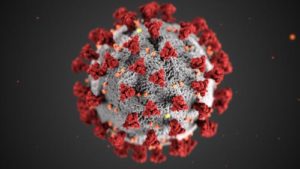Written by Taylor Woosley, Staff Writer. Study results show that subjects with higher levels of genus Collinsella resulted in lower mortality rates, potentially stemming from the anti-inflammatory and anti-apoptotic properties of ursodeoxycholate produced by the bacteria.
 COVID-19 was the result of severe acute respiratory syndrome coronavirus 2 (SARS-CoV-2). This virus is known for damaging the respiratory system in the intestinal tract and has also been studied for its effects on the microbiome. Previous studies and meta-analysis have estimated that around 15% of those infected with COVID-19 experience digestive symptoms 1. Patients were noted to have significant alterations in fecal microbiomes, characterized by increases in opportunistic pathogens along with a significant decrease in beneficial commensals 2. Common digestive symptoms for those infected include vomiting, diarrhea, and abdominal pain, with enhanced intestinal dysfunction leading to an increase in inflammatory cytokines 3. Chronic inflammation may lead to a weakened epithelial barrier, resulting in further damage to the integrity of the microbiome 4. Patients with present dysbiosis (unbalanced ratio of beneficial and opportunistic bacteria) may experience more severe symptoms compared to those with a healthy functioning microbiome.
COVID-19 was the result of severe acute respiratory syndrome coronavirus 2 (SARS-CoV-2). This virus is known for damaging the respiratory system in the intestinal tract and has also been studied for its effects on the microbiome. Previous studies and meta-analysis have estimated that around 15% of those infected with COVID-19 experience digestive symptoms 1. Patients were noted to have significant alterations in fecal microbiomes, characterized by increases in opportunistic pathogens along with a significant decrease in beneficial commensals 2. Common digestive symptoms for those infected include vomiting, diarrhea, and abdominal pain, with enhanced intestinal dysfunction leading to an increase in inflammatory cytokines 3. Chronic inflammation may lead to a weakened epithelial barrier, resulting in further damage to the integrity of the microbiome 4. Patients with present dysbiosis (unbalanced ratio of beneficial and opportunistic bacteria) may experience more severe symptoms compared to those with a healthy functioning microbiome.
A specific group of bacteria, genus Collinsella, has been studied for its potentially protective effects against COVID-19-related gut dysregulation. Collinsella is a crucial intestinal bacterium necessary to produce ursodeoxycholic acid (UDCA), a secondary bile acid, which can significantly reduce inflammation and prevent cell death 5. In particular, UDCA has the ability to decrease levels of pro-inflammatory cytokines (TNFα, IL-1, IL-2, and IL-6) 6. Previous studies have highlighted UDCA’s role in inflammation reduction through its ability to prevent virus entry by binding to the receptor binding domain of spike glycoprotein of SARS-CoV2 7.
Hirayama et. al further explored the potential association between the presence of ursodeoxycholic acid-producing bacterium to the reduction in COVID-19 disease severity and mortality using a generalized linear model (GLM) to predict the rate of mortality from COVID-19 using gut microbiota. Researchers examined the 16S rRNA V3-V5 sequencing data of the 953 subjects of varying ages from ten countries with high medical and hygiene standards in this observational study. Subject anonymity resulted in no data pertaining to what number of subjects were infected with COVID-19. In addition, the use of linked inference of genomic experimental relationships analysis (LIGER), a single cell RNA-seq tool, produced the non-negative matrix factorization of gut microbiota in the subjects, which yielded five enterotypes. Of the five enterotypes, researchers found that mortality rates were increased and abundance of genus Collinsella was decreased from enterotypes 1 to 5. Data gathered from examination of the enterotypes conclude that genus Collinsella was negatively correlated with the mortality rate with a significantly low p-value of 1.58 x 10-15.
In conclusion, study data show the potential association of high levels of genus Collinsella and the reduction of COVID-19 mortality probability. The production of ursodeoxycholate by Collinsella is what offers subjects protective properties against COVID-19 due to the pro-inflammatory cytokine suppression abilities of UDCA. Further studies should explore the gut microbiome of confirmed infected subjects to better identify the state of the microbiome of those with COVID-19.
Source: Hirayama, Masaaki, Hiroshi Nishiwaki, Tomonari Hamaguchi, Mikako Ito, Jun Ueyama, Tetsuya Maeda, Kenichi Kashihara, Yoshio Tsuboi, and Kinji Ohno. “Intestinal Collinsella may mitigate infection and exacerbation of COVID-19 by producing ursodeoxycholate.” PloS one 16, no. 11 (2021): e0260451.
© 2021 Hirayama et al. This is an open access article distributed under the terms of the Creative Commons Attribution License, which permits unrestricted use, distribution, and reproduction in any medium, provided the original author and source are credited.
Click here to read the full text study.
Posted April 5, 2022.
Taylor Woosley studied biology at Purdue University before becoming a 2016 graduate of Columbia College Chicago with a major in Writing. She currently resides in Glen Ellyn, IL.
References:
- Zuo T, Zhan H, Zhang F, et al. Alterations in Fecal Fungal Microbiome of Patients With COVID-19 During Time of Hospitalization until Discharge. Gastroenterology. Oct 2020;159(4):1302-1310.e5. doi:10.1053/j.gastro.2020.06.048
- Zuo T, Zhang F, Lui GCY, et al. Alterations in Gut Microbiota of Patients With COVID-19 During Time of Hospitalization. Gastroenterology. Sep 2020;159(3):944-955.e8. doi:10.1053/j.gastro.2020.05.048
- Villapol S. Gastrointestinal symptoms associated with COVID-19: impact on the gut microbiome. Transl Res. Dec 2020;226:57-69. doi:10.1016/j.trsl.2020.08.004
- Trottein F, Sokol H. Potential Causes and Consequences of Gastrointestinal Disorders during a SARS-CoV-2 Infection. Cell reports. Jul 21 2020;32(3):107915. doi:10.1016/j.celrep.2020.107915
- Keely SJ, Steer CJ, Lajczak-McGinley NK. Ursodeoxycholic acid: a promising therapeutic target for inflammatory bowel diseases? American journal of physiology Gastrointestinal and liver physiology. Dec 1 2019;317(6):G872-g881. doi:10.1152/ajpgi.00163.2019
- Subramanian S, Iles T, Ikramuddin S, Steer CJ. Merit of an Ursodeoxycholic Acid Clinical Trial in COVID-19 Patients. Vaccines (Basel). Jun 19 2020;8(2)doi:10.3390/vaccines8020320
- Yadav R, Choudhury C, Kumar Y, Bhatia A. Virtual repurposing of ursodeoxycholate and chenodeoxycholate as lead candidates against SARS-Cov2-Envelope protein: A molecular dynamics investigation. Journal of Biomolecular Structure and Dynamics. 2020:1-12.
